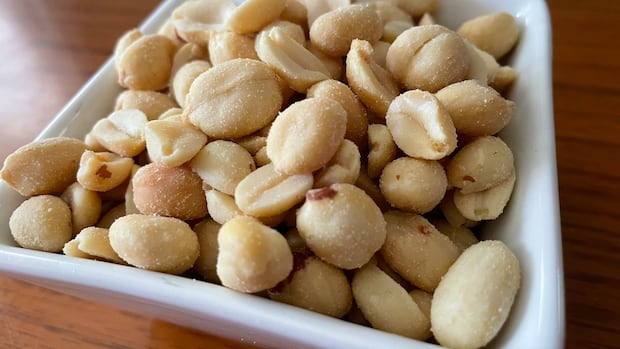HealthU.S. researchers found that peanut allergies in children ages zero to three declined by more than 27 per cent after guidance for high-risk kids was first issued in 2015. Before then, doctors had recommended delaying feeding children peanuts and other foods likely to trigger allergies until age three.Before 2015, doctors recommended delaying feeding children peanuts and other allergenic foods until age 3The Associated Press · Posted: Oct 20, 2025 9:56 AM EDT | Last Updated: 5 hours agoSalted peanuts rest in a tray. New research found that about 60,000 children have avoided developing peanut allergies because of guidance first issued in 2015 about when to introduce peanut products to children. (Evan Salinas/CBC)A decade after a landmark study proved that feeding peanut products to young babies could prevent the development of life-threatening allergies, new research finds the change has made a big difference in the real world.About 60,000 children have avoided developing peanut allergies after guidance first issued in 2015 upended medical practice by recommending that caregivers introduce the allergen to infants starting as early as four months.”That’s a remarkable thing, right?” said Dr. David Hill, an allergist and researcher at Children’s Hospital of Philadelphia and author of a study published Monday in the medical journal Pediatrics.”I can actually come to you today and say there are less kids with food allergy today than there would have been if we hadn’t implemented this public health effort,” he added.Hill and colleagues analyzed electronic health records from dozens of pediatric practices to track diagnoses of food allergies in young children before, during and after the guidelines were issued.The researchers found that peanut allergies in children ages zero to three declined by more than 27 per cent after guidance for high-risk kids was first issued in 2015, and by more than 40 per cent after the recommendations were expanded in 2017.WATCH | Some schools are allowing nuts again despite allergy risks:Some schools are allowing nuts again despite allergy risksCanadian researchers found that restricting foods, such as nuts and peanuts, at schools isn’t the best way to protect kids from life-threatening allergic reactions. CBC’s Deana Sumanac-Johnson breaks down the change.The effort hasn’t yet reduced an overall increase in food allergies in the U.S. in recent years. About eight per cent of children are affected, including more than two per cent with a peanut allergy.An allergic reaction to peanuts happens when the body’s immune system mistakenly identifies proteins in peanuts as harmful and releases chemicals that trigger allergic symptoms, including hives and respiratory symptoms. Sometimes, it can even cause anaphylaxis, a life-threatening kind of reaction that can include a drop in blood pressure, dizziness, trouble breathing and more.Groundbreaking 2015 studyFor decades, doctors had recommended delaying feeding children peanuts and other foods likely to trigger allergies until age three. But in 2015, Gideon Lack at King’s College London published the groundbreaking Learning Early About Peanut Allergy, or LEAP, trial.Lack and colleagues showed that introducing peanut products in infancy reduced the future risk of developing food allergies by more than 80 per cent. Later analysis showed the protection persisted in about 70 per cent of kids into adolescence.The study immediately sparked new guidelines urging early introduction of peanuts, and the Canadian Paediatric Society recommends introducing common allergenic foods, including peanuts, to babies between four and six months of age. But putting those guidelines into practice has been slow in some places.Only about 29 per cent of pediatricians and 65 per cent of allergists reported following the expanded guidance issued in 2017, surveys found. Confusion and uncertainty about the best way to introduce peanuts early in life led to the lag, according to a commentary that accompanied the study. Early on, medical experts and parents alike questioned whether the practice could be adopted outside of tightly controlled clinical settings.The data for the analysis came from a subset of participating practice sites and may not represent the entire U.S. pediatric population, noted the commentary, led by Dr. Ruchi Gupta, a child allergy expert at Northwestern University.That confusion and uncertainty is something Chantelle Velmont knows well. The Toronto mother knew she should introduce allergenic foods to her son — who is now seven months old — early, but didn’t think there was any rush, especially since her pediatrician didn’t make any mention of the importance of trying these foods at her son’s four-month appointment.When Velmont did give her son a peanut product to try at 5½ months of age, his lips swelled immediately and he developed a rash. He’s since been diagnosed with allergies to peanuts and eggs by a pediatrician.“It’s definitely something I’m nervous about,” Velmont said. Her son has an EpiPen now and she says she carries it everywhere she goes.Velmont says she wishes there was more clear guidance from medical professionals and prenatal classes about how to approach giving kids allergens for the first time. “There’s tons of information out there online, but it’s almost overwhelming, all the … recipes and mom influencers who are suggesting different ways of making solids for your little one. It would be nice if there was just clear, simple guidance about the main allergens, and how to approach those,” Velmont said.Study reinforces guidanceStill, the study authors conclude that the new research offers “promising evidence that early allergen introduction is not only being adopted but may be making a measurable impact.”Advocates for the 33 million people in the U.S. with food allergies welcomed signs that early introduction of peanut products is catching on.Peanuts, cashews and other nuts for oral immunotherapy are seen in a pediatric allergist’s office. (Craig Chivers/CBC)”This research reinforces what we already know and underscores a meaningful opportunity to reduce the incidence and prevalence of peanut allergy nationwide,” said Sung Poblete, chief executive of the non-profit group Food Allergy Research & Education (FARE).Dr. Derek Chu, Canadian Institutes of Health Research chair in allergy and a professor of medicine at McMaster University who wasn’t involved in the study, says it has “very encouraging implications,” because it shows the current guidelines are effective, and that rigorous science can have a real-world impact.But he acknowledges that getting information out to new and expecting parents about when and how to introduce allergens is a challenge. Chu says that when babies are “developmentally ready” within the four- to six-month age range, parents should “introduce food allergens early, often and keep it consistent.”The risk of life-threatening reactions is extremely low, according to Food Allergy Canada, though if infants do experience extreme symptoms like swelling, widespread hives or breathing symptoms, parents should seek medical attention immediately. He says thinning out peanut butter with breast milk, formula or water, or mixing a small amount with puree, can help when trying to feed peanut products to babies for the first time, before ramping up those amounts consistently. That guidance goes beyond peanuts, he reminds — it’s important to introduce all common allergens, including dairy, soy, wheat, sesame, egg, fish, shellfish and other nuts, in a similar way.“You can do it and you can do it safely,” Chu said. “Just like anything else, those baby steps and repetition are so important for baby’s development.”With files from CBC News’ Christine Birak, Lauren Pelley and Abby Hughes
Guidance to feed babies peanuts helped tens of thousands of kids avoid allergies, study finds











